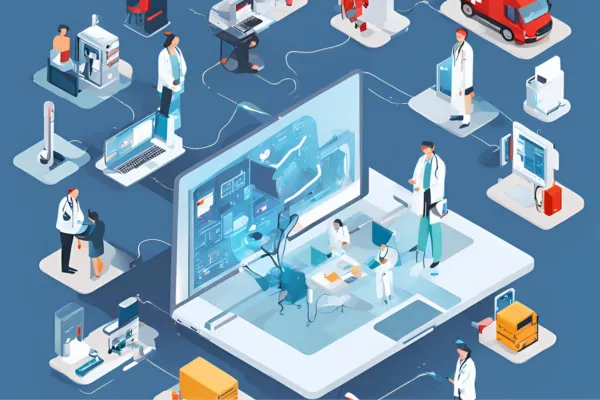
The Rise of AI in Healthcare Logistics
Artificial intelligence (AI), once a concept relegated to the realms of science fiction, is now firmly rooted in reality. Its impact is being felt across diverse sectors, from finance to manufacturing, and healthcare is no exception. However, the integration of AI into healthcare logistics represents a particularly significant development. It's not merely an incremental improvement but a paradigm shift that has the potential to fundamentally transform the way healthcare is delivered, from the moment a patient seeks care to the moment they receive treatment.
In the past, healthcare logistics was often characterized by manual processes, fragmented data, and logistical challenges that could delay critical care. Today, AI is poised to revolutionize this landscape by introducing unprecedented levels of efficiency, accuracy, and patient-centricity. Imagine a healthcare system where medical supplies are automatically replenished based on predicted demand, where patient medications are delivered precisely when and where they are needed, and where healthcare providers have real-time visibility into the entire supply chain. This is the future that AI promises to deliver.
In this blog post, we will embark on a journey to explore the many facets of AI's impact on healthcare logistics. We'll delve into specific examples of how AI is already being used to optimize inventory management, streamline transportation, and enhance patient care. We'll also look ahead to the future, examining the potential of AI to address some of the most pressing challenges facing healthcare logistics today, such as the need for faster and more reliable delivery of life-saving medications and the importance of ensuring equitable access to healthcare in remote and underserved areas.
Whether you're a healthcare provider, a logistics professional, or simply someone interested in the future of healthcare, this blog post will provide valuable insights into the transformative power of AI in healthcare logistics. Join us as we explore this exciting frontier and discover how AI is reshaping the way we deliver care, ultimately leading to a healthier and more equitable world.
Understanding AI in Healthcare Logistics
At its core, AI refers to the ability of machines to mimic human intelligence, including learning, reasoning, problem-solving, and decision-making. In the context of healthcare logistics, AI algorithms can analyze vast amounts of data to identify patterns, predict outcomes, and optimize complex processes. This has significant implications for the entire healthcare supply chain, from inventory management to patient care.
Key Applications of AI in Healthcare Logistics
Demand Forecasting and Inventory Optimization:
AI algorithms can analyze historical data, market trends, and even social media sentiment to predict demand for medical supplies and pharmaceuticals accurately. This enables healthcare facilities to optimize inventory levels, reduce waste, and prevent stockouts, ensuring that essential resources are available when and where they are needed most.
Route Optimization and Delivery Efficiency:
AI-powered route optimization software can consider factors like traffic conditions, delivery time windows, and vehicle capacity to determine the most efficient routes for transporting medical supplies. This not only reduces delivery times but also minimizes fuel consumption and carbon emissions, contributing to a more sustainable healthcare logistics system.
Warehouse Automation and Robotics:
AI-enabled robots are transforming warehouse operations in healthcare logistics. These robots can autonomously pick, pack, and sort medical supplies, significantly increasing efficiency and reducing the risk of human error. Additionally, AI-powered vision systems can be used for quality control, ensuring that only products meeting the highest standards are shipped to healthcare facilities.
Predictive Maintenance:
AI algorithms can monitor the condition of medical equipment and vehicles in real time, predicting when maintenance is required. This proactive approach to maintenance can prevent costly breakdowns and ensure that critical medical devices are always operational, enhancing patient safety.
Chatbots and Virtual Assistants:
AI-powered chatbots and virtual assistants are being used to streamline communication between healthcare providers, suppliers, and patients. These tools can answer inquiries, track orders, and even provide basic medical advice, freeing up human staff to focus on more complex tasks.
Personalized Medicine and Logistics:
AI is playing a crucial role in the development of personalized medicine, where treatments are tailored to individual patients' genetic profiles. This requires a highly sophisticated logistics system to ensure that the right medications and therapies reach the right patients at the right time. AI can help optimize this complex supply chain, ensuring that personalized medicine is delivered efficiently and effectively.
The Future of AI in Healthcare Logistics
The potential of AI in healthcare logistics is vast and still evolving. As AI technology continues to advance, we can expect even more innovative applications to emerge. For instance, AI could be used to create self-healing supply chains that can automatically adapt to disruptions, such as natural disasters or pandemics. Additionally, AI-powered drones could be used for last-mile delivery of medical supplies in remote areas, improving access to healthcare for underserved populations.
Conclusion
The rise of AI in healthcare logistics is not just a technological trend; it is a paradigm shift that has the potential to transform the way healthcare is delivered. By harnessing the power of AI, healthcare providers can optimize supply chains, reduce costs, improve patient care, and ultimately save lives. As AI continues to evolve, it will undoubtedly play an increasingly vital role in shaping the future of healthcare logistics, making it more efficient, responsive, and patient-centric. The future of healthcare logistics is undeniably intelligent.